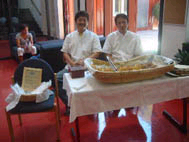| Mad About Dough
 |
| Crazy Bake sold its baked goods to athletes visiting Beijing this autumn for the Paralympic Games. |
Crazy Bake is helping China's mental patients help themselves, but they badly need more sales.
NO bread in China tastes better than Crazy Bake bread. That's what expatriates and worldly locals are saying of the fresh, brown-colored German farmhouse-style loaves, as well as the buns and bagels being baked by the Beijing-based collective.
But the venture, which made the pages of the respected German news magazine Der Spiegel, has been struggling to find more distribution outlets for its products. Additional sales points are vital if the organization is to improve the lives of patients in a Beijing psychiatric institution, says Crazy Bake co-founder Yvonne Gerig. A German with impeccable Chinese who has lived in Beijing for a decade, Gerig started the Crazy Bake venture with fellow expatriates Natascha Prigge and John Zane.
Crazy Bake make their products at the Beijing Chaoyang Mental Health Center, an institution housing 180 patients on the northern outskirts of Beijing. Patients who have been trained in baking through the program each get a RMB 80 monthly share of the profits, which allows them to purchase provisions. Gerig says finding more outlets for the company's products will allow the operation to increase patients' living allowance and provide basic comforts at the mental health hospital where they reside.
The bakery was established in 2004 when two well-meaning expatriates, missing European-style bread and buns, decided to open a bakery and help a friend at the same time. The friend was Yang Yun, a psychiatric nurse and the big-hearted proprietor of the Chao-yang Mental Health Center. Unusually, Yang's hospital is a privately run establishment, meaning there was little bureaucracy to surmount. Keen to better her patients' lives, Yang was happy to covert several rooms in the two-story concrete building into a bakery.
Setting up the bread-making operation was a way of shifting care of her patients away from a dependency on drugs towards a more holistic approach, explains Yang. A series of cash donations from European and Chinese supporters allowed the project to purchase two industrial-sized ovens and all the utensils and Tupperware required for a bakery start-up. An all-purpose fermentation oven was shipped from Germany.
Profits from the venture, currently running at RMB 1,000 a month, are growing, but are desperately dependent on expanding distribution. Administered by an independent trust, the profits have provided a washing machine for both the male and female patients' wards, as well as new bed linen and air conditioners for the patients' common room. To give the patients more diversions, Crazy Bake bought a fridge for ice cream and a karaoke machine. Pet care and gardening, regularly used in European mental health care, are also being considered by Yang.
Crazy Bake has been approved by local health authorities, who see it as the kind of win-win solution typically promoted by policy makers in various sectors of the Chinese economy and society. The country's largely state-run network of mental health institutions is willing to adapt modern care methods in place of the current medication-dependent system, but is held back by budget restraints.
Crazy Bake may also help outsiders understand the possibilities for mental health patients. Since many of the patients are normal most of the time — ailments such as schizophrenia and depression only manifest themselves periodically — outsiders find it very hard to tell that the chatty bakers reside in a mental institution. Gerig tells the story of a university educated baker/patient who regularly joins in dinners with her friends outside the institution. Fang (not his real name), a 25-year-old Beijinger, bakes cinnamon rolls and muffins, but also has a degree in finance. Police dropped him at Yang's door and asked her to take him in.
The kitchen is fitted with baking utensils and basic machines imported from Europe. "Everything is plastic, including the knives," Gerig says in a good-humored reminder that this is an institution where catastrophic outbreaks of violence are possible.
There are many challenges facing the operation, but the largest is distribution. Finding people to buy the bread is difficult in a country which prefers steamed buns and tofu over whole wheat brown bread or fruit scones. The high school attached to the German embassy takes a weekly order. Western-style cafés and sandwich bars, although increasingly common in Beijing, are worried about committing since demand is unpredictable, explains Gerig. Many local establishments bake cheap variations from ready-mix packs.
The bakers recently asked co-founder Natascha Prigge to source bicycles so they can deliver bread. She's currently searching for funds. Crazy Bake has already paid back its founders' investment of time and effort; Gerig says her greatest reward is the dignity and independence she's been able to give to patients. "They were really overwhelmed and asked me how it was that they're being paid to do something useful and which they enjoy."
Crazy Bake may also diversify. Its staff have been introduced to embroidery and other commercially viable crafts, and there's already a range of seasonal products, such as Christmas decorations, stitched by patients. A company whose products are as compelling as its story, Crazy Bake deserves to expand. | 